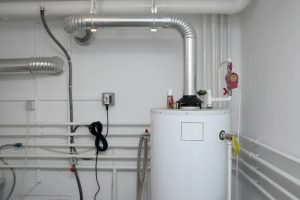 The two most common types of heating systems found in homes are gas-fired boilers and furnaces. The furnace is by far the most popular type of home heating system in the U.S., but the boiler has remained competitive for a number of reasons. Boilers require fewer repairs on average, can cut down on energy costs, provide heat without blowing around dust, and operate at quiet levels. They also tend to outlast furnaces. The average furnace life expectancy is 15 to 20 years. Boilers can last up to 30 years, letting a whole generation grow up in a house with the same heating system.
The two most common types of heating systems found in homes are gas-fired boilers and furnaces. The furnace is by far the most popular type of home heating system in the U.S., but the boiler has remained competitive for a number of reasons. Boilers require fewer repairs on average, can cut down on energy costs, provide heat without blowing around dust, and operate at quiet levels. They also tend to outlast furnaces. The average furnace life expectancy is 15 to 20 years. Boilers can last up to 30 years, letting a whole generation grow up in a house with the same heating system.
But it isn’t enough to simply know a boiler lasts longer. Why it last longer helps to understand how boilers work and why they have so many other advantages. Let’s take a closer look at boiler longevity.
Boilers Have Simpler Mechanical Construction
A boiler isn’t a “simple” machine. All boiler systems require skilled professionals to work on them, and they make use of advanced technology to make them energy efficiency. But boilers are constructed with a small number of moving parts. Compared to furnaces and heat pumps, both of which have numerous mechanical components, boilers have only a few parts that will wear down from mechanical stress. A furnace relies on a number of motors to operate, all of which will deteriorate over time because of strain. A boiler, however, only has one key mechanical component, which is the circulator pump that moves water from the tank and then sends it around the pipes of the house. With fewer parts that wear down with use, a boiler will put in more years than either a furnace or heat pump
Boilers Have Defenses against Corrosion
You might imagine that a boiler still is up against foes that a furnace never has to worry about: corrosion and rust. Isn’t the presence of water a danger to the boiler’s operation?
The answer is, “yes,” but boilers are constructed to resist corrosion for many years. In fact, furnaces are also at risk of corrosion—a higher risk than furnaces! How is that possible? The reaction of combustion gases with the metal in a furnace will create corrosion over time. This corrosion is likely to set in on a furnace much sooner than it would start in on a boiler. (However, you must keep current with heating maintenance each year to ensure corrosion stays away.)
You’ll Still Need a Boiler Replacement at Some Point
No heating system, no matter how durable, has an infinite lifespan—the boiler is no exception. Eventually the stress of operation and the presence of water will lead to a boiler that is losing its efficiency and effectiveness. When the boiler in your home starts to cost too much to operate and is running up repair bills, it’s time to look into a new boiler installation in Winnetka, IL or elsewhere in Chicagoland. You can rely on our experts for boiler replacement services as well as any repairs your boiler you may need in the future.
Malek Heating & Cooling: Serving the Chicagoland area since 1998. Let our heating professionals find the right system for you!